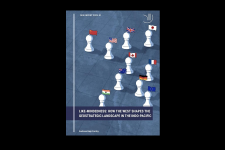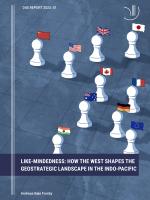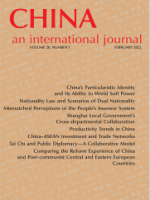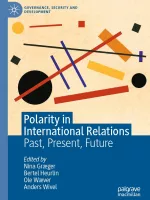Like-mindedness: How the West shapes the geostrategic landscape in the Indo-Pacific

In the past few years, the Indo-Pacific region has emerged as a pivotal geostrategic arena against the backdrop of China’s growing power and influence. As the United States and other Western countries have deepened their own strategic engagement in the region, IR scholars and regional experts have focused on the shifting security architecture, the formation of new economic free trade blocs, competing infrastructural investment agendas and the rapidly expanding technological decoupling agenda. What has received far less attention, however, is the role played by identity-forming processes of coalition-building and boundary-drawing in the Indo-Pacific region. Indeed, like-mindedness – the idea of sharing basic political values and principles – seems to have become an important criterion for Western countries as they step up their strategic engagement with, and coalition-building in, the Indo-Pacific, while increasingly criticizing and distancing themselves from China. By affecting strategic choices about whom to rely on for security assistance, geoeconomic partnership and infrastructural/technological connectivity, such coalition-building efforts will shape the geostrategic landscape of the region in fundamental ways.
In his new DIIS Report, Senior Researcher Andreas Bøje Forsby examines not only how and to what extent Western governments, both individually and collectively, employ such identity-based geostrategic practices, but also how China and the ASEAN countries have responded. Notwithstanding considerable diversity among the Western countries, the report demonstrates that they, as a US-led group, have adopted a remarkably strong common stance in the past two years, collectively portraying themselves as a coalition of like-minded states, sharing a broad set of liberal values and principles beyond a commitment to a rules-based order. Moreover, they have consolidated their common stance by promoting a narrative about safeguarding a ‘Free and Open Indo-Pacific’ in the face of China’s coercive and assertive behavior. Pushing back against this, the Chinese Government has itself adopted a two-pronged identity-based strategy, consisting not merely of a counter-narrative about American hegemony and Cold War mentality, but also of China’s own vision for a regional ‘community with a shared future’ in the Asia-Pacific. Meanwhile, navigating these competing coalition-building endeavors, the ASEAN countries seem at risk of being increasingly divided as the regional geostrategic landscape is being reshaped.
DIIS Experts





